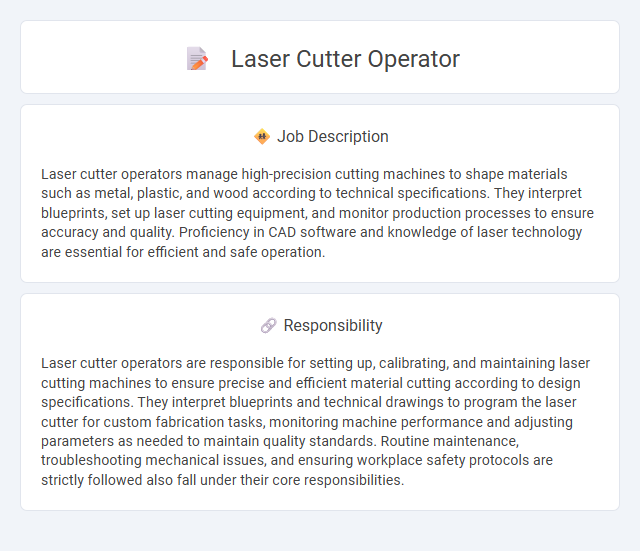
Laser cutter operators manage high-precision cutting machines to shape materials such as metal, plastic, and wood according to technical specifications. They interpret blueprints, set up laser cutting equipment, and monitor production processes to ensure accuracy and quality. Proficiency in CAD software and knowledge of laser technology are essential for efficient and safe operation.
Individuals with strong attention to detail and good hand-eye coordination are likely suited for a laser cutter operator job. People who prefer repetitive tasks and can maintain focus in environments with loud machinery may find this role fitting. Those with respiratory sensitivities or difficulty standing for long periods might face challenges in this position.
Qualification
Laser cutter operators must possess strong technical skills and experience with CNC machinery, CAD software, and precision measurement tools. A high school diploma or equivalent is typically required, along with specialized training or certification in laser cutting technology. Attention to detail, the ability to read and interpret technical drawings, and knowledge of material properties are essential qualifications for ensuring accurate and efficient cutting operations.
Responsibility
Laser cutter operators are responsible for setting up, calibrating, and maintaining laser cutting machines to ensure precise and efficient material cutting according to design specifications. They interpret blueprints and technical drawings to program the laser cutter for custom fabrication tasks, monitoring machine performance and adjusting parameters as needed to maintain quality standards. Routine maintenance, troubleshooting mechanical issues, and ensuring workplace safety protocols are strictly followed also fall under their core responsibilities.
Benefit
Operating a laser cutter likely offers high earning potential and the opportunity to develop specialized technical skills in precision manufacturing. This role often provides a safe and controlled working environment, reducing the risk of accidents compared to other industrial jobs. Employees may also benefit from steady employment in industries such as automotive, aerospace, and custom fabrication, where demand for laser cutting expertise remains strong.
Challenge
Laser cutter operator jobs probably involve precise control over cutting equipment to achieve detailed designs, which may present a significant challenge in maintaining accuracy under time constraints. Handling complex materials and adapting to varying production specifications likely demands a high level of technical skill and problem-solving ability. The role might also require troubleshooting unexpected machine errors, adding potential difficulty in maintaining consistent output quality.
Career Advancement
Laser cutter operators develop technical expertise in precision cutting and machine maintenance, enabling them to advance into supervisory or quality control roles. Mastery of CAD software and understanding of various materials enhances opportunities for promotion to production planning or engineering support positions. Continuous skill development in advanced laser technologies positions operators for specialized roles in research and development or manufacturing management.
 kuljobs.com
kuljobs.com